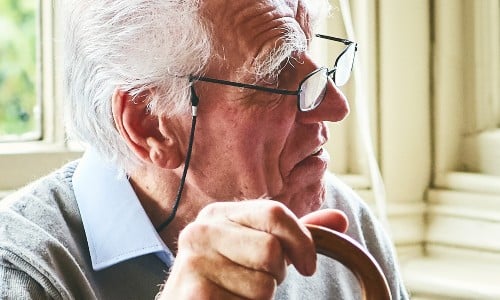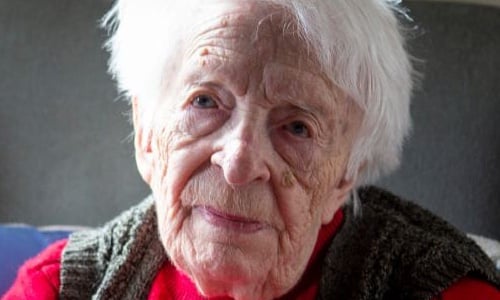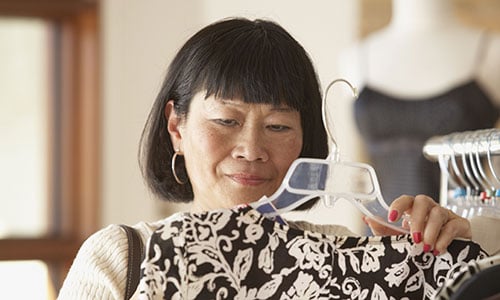“My Mum is 91 and I don’t know how she would manage if it wasn’t for me and my brother. She can just about text but those automated phone systems defeat her, they are so confusing. And engaging with her GP practice has become so hard for her.”
This is what I was told this week – by a consultant in one of our big London teaching hospitals. At Age UK it’s something we have heard quite a lot about during the pandemic and these stories don’t seem to be going away.
As a result, there is no doubt in our minds that some older people are finding it extremely challenging to manage the shift towards the greater use of telephone and digital communication in GP practices, a change accelerated by the pandemic. Especially if they are not online and do not find it very easy using the phone because they are hard of hearing, or have cognitive decline, are very much on their own and have no family member of friend to help them.
One size doesn't fit all
It’s impossible to know at the moment how many older people are struggling with these new approaches, but it certainly isn’t everyone. We know that some older people are completely comfortable using iPads, smartphones and the like. People in this group may well be finding remote consultations more convenient than having to visit their surgery to see a clinician face to face every time. And for many other older people the telephone – often a landline – is their main form of communication and one they are happy to use for at least some of their interactions with their surgery.
My own GP practice has adopted an app called Doctor IQ and once I got the hang of it I used it a lot on behalf of my Mum. Our practice is super-responsive to it, guaranteeing a reply the same day if you file your request by 3pm.
However, my Mum would have had no idea how to use this system herself, not being a computer user, and I couldn’t help worrying about the likely inequality between the prompt service she was receiving via the app, and the likely experience of other patients who had to rely on more traditional methods. Not being a computer user mustn’t mean you get a second class service, especially in the NHS, which we cherish in this country in part because equality of access is in its DNA. We mustn’t lose that.
The online divide
Beyond the age of 75 the fact is that most older people are not online so really it would be sensible for practice staff to take this into account – I’m not sure they always do at present. The oldest patients on their lists may be proficient computer users but they should probably start from the assumption that they are not.
In addition, expecting an older person who has never used IT to start doing so at their local surgery feels unrealistic, and possibly quite anxiety-provoking, not to say infuriating, for some too. Instead, ensuring there are reasonable, non-digital alternatives for those who need them is surely the way to go.
Still a place for face to face
It isn’t only some older people who are alienated by this shift towards more remote access to GPs. Even for those of us who are happy to embrace it there are likely to be some occasions when we think it really is important to see a clinician face to face. We may be shy about writing or talking about an intimate health problem, or a mental health concern, except face to face with a doctor.
Also, some of us find it much easier than others to articulate what we want over the phone or in writing. Functional illiteracy remains a significant and growing problem in our society, with perhaps as many as one in six of us in this position overall. These realities must be factored in.
Technology must meet needs
Having said this, increasing the use of digital technology in GP practices needn’t be a problem in my view. It has the capacity to improve efficiency and expand patient choice - but only if it is used in a way that is sensitive to the diversity of people’s needs.
I understand that before the pandemic the ratio of remote to in-person consultations stood at about 1:9. By the height of lockdown in spring 2020 that had reversed to 9:1. Now, as we look ahead it may be that the equilibrium should settle at about 50:50, with some kind of digital or telephone triage being used in most cases ‘at the front door’ to help decide who needs to see a GP and who doesn’t. However, this triage approach shouldn’t be mandated for all because we know that some older people give up entirely at this stage. That’s neither in their best interests, nor in the NHS’s – there has to be another way for those who really need it.
The pressures facing GPs
This debate about access to GPs, which to my mind sometimes feels unhelpfully heated at the moment, cannot be separated from the reality of the state of general practice in our country. GP surgeries are incredibly important – the main entry point into the service. They are, however, under a lot of pressure.
We do not have enough GPs, some are retiring early, and we are not training enough new ones to replace them. In addition, at the moment, many GPs are totally worn out after 18 months of dealing with COVID-19 and its consequences, plus the highly successful vaccination programme, and they are also now facing a lot of pent up demand.
The public and GPs alike therefore have a shared interest in the Government’s Spending Review investing more in this part of the NHS. It’s long overdue, since the tendency is for most of the available resources to go into hospitals, leaving GP practices and community health services like District Nurses with crumbs. It’s time that changed.
My view
I think we need to do better at looking after our GPs in terms of their workloads and support structures, and that way they will hopefully be better able to look after the rest of us. GPs are not badly paid so this is not about raising their salaries; it’s about keeping the GP service sustainable, and enabling GPs and their increasingly multidisciplinary teams to serve their local communities well.
It’s also about funding and organising the education and training of medics so we can be confident there will be enough new GPs coming on stream now and into the future. It’s all eminently do-able, provided the Spending Review provides the funds.
Come on Rishi Sunak!






